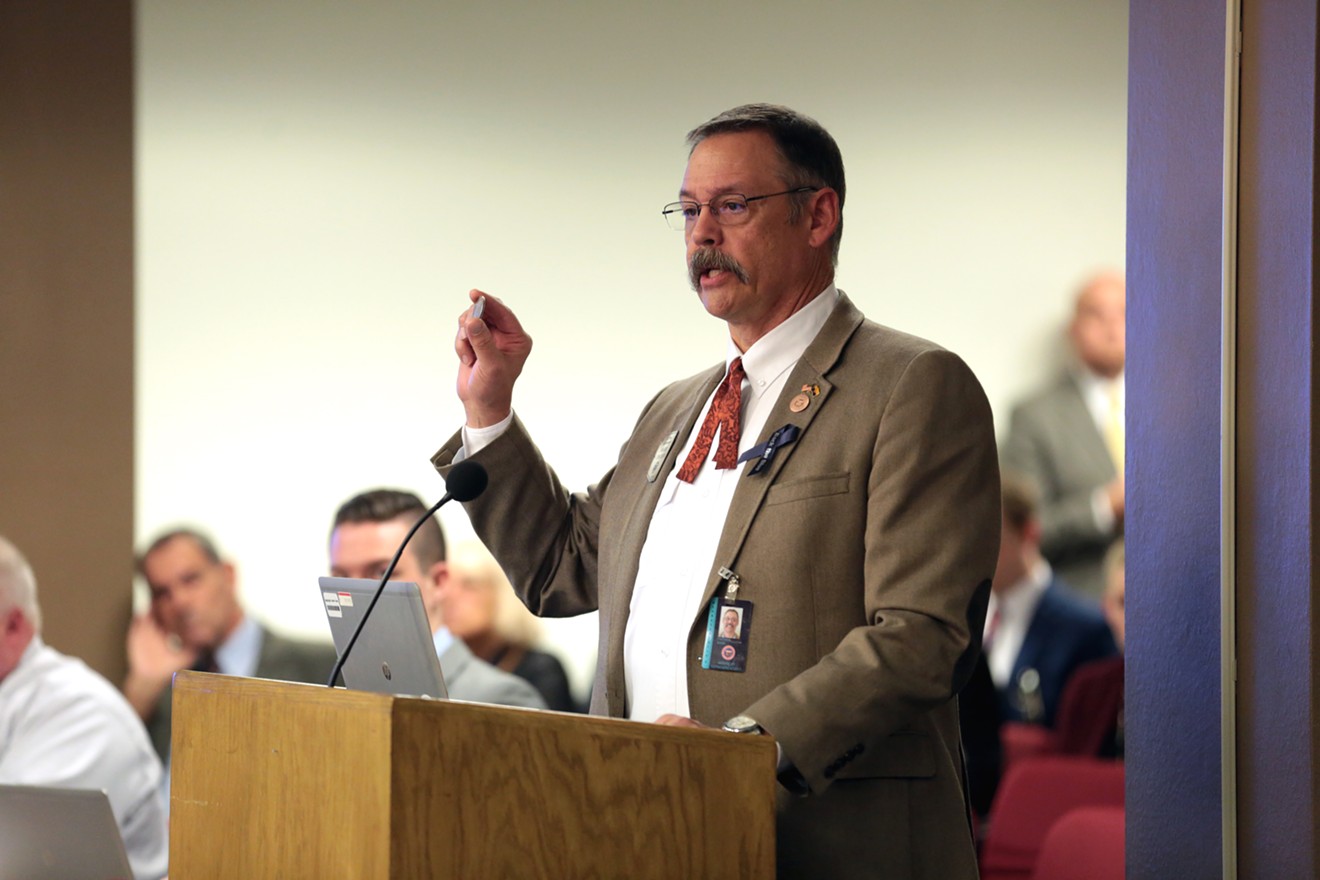Representative Mark Finchem, a Republican from Oro Valley near Tucson, introduced HB 2002 last month. The nine points of Finchem’s proposed ethical code are identical to the proposed code of ethics from the Stop K-12 Indoctrination campaign, a project sponsored by the far-right, anti-Muslim David Horowitz Freedom Center.
In some cases, minor differences in wording differentiate the two versions of the code, but the substance of each of the nine points is the same in both. The similarities were first spotted by Peter Greene, an education policy blogger.
The Southern Poverty Law Center, which monitors hate groups, describes founder David Horowitz as “a driving force of the anti-Muslim, anti-immigrant, and anti-black movements.”
The website for Stop K-12 Indoctrination describes the effort as an essential fight against a perceived tide of leftist indoctrination in American public schools. As purported examples of indoctrination, the Stop K-12 Indoctrination campaign lists a required racial justice and equity training at an Edina, Minnesota, school district and a Maryland high school that, according to a lawsuit filed by a conservative activist law firm, required students to write the Islamic creed as part of an assignment.
“Our public schools have traditionally been the cornerstone of our country's democratic values, teaching students how to think not what to think. No longer,” the Stop K-12 Indoctrination website states. “Today, no age group and no corner of our K-12 classrooms are immune from the left's ideological aggression.”
So far, Finchem has left out any mention of the Stop K-12 Indoctrination campaign when discussing his bill publicly, including during a lengthy interview with Phoenix New Times on December 18. At the time, Finchem explained that his bill was inspired by parents who had approached him, disturbed by teachers expressing personal political views in the classroom.
Finchem said that apparently word has spread in parental circles now that he has introduced the bill. “I’ve got parents calling me from all over the place wanting to tell me their story,” he said at the time.
The bill would bar teachers from endorsing candidates or issues and advocating “in a partisan manner for any side of a controversial issue.”
Under Finchem’s ethical code, teachers have to “provide students with materials supporting both sides of the controversy and present those views in a fair-minded and nonpartisan manner.” Teachers would be allowed express an opinion on a controversial issue, but “only in a manner in which students understand that students may make independent decisions and disagree with the teacher without incurring any penalty.”
The similarities between Finchem’s bill and Stop K-12 Indoctrination’s model legislation are uncanny.
Both the Stop K-12 Indoctrination code and Finchem’s code feature the bizarre and very specific requirement that teachers not “segregate students according to race, or single out one racial group of students as being responsible for the suffering or inequities experienced by another racial group of students.” A one-word difference separates the two versions of this ethical requirement: “being responsible” in Finchem’s code, versus simply “responsible.”
In a video explaining the code of ethics posted on the Stop K-12 Indoctrination website, an editor for the site says the prohibition is necessary because of reports that educators have taught students the concept of white privilege.“I know this sounds like a no-brainer, but it's actually not, with the whole white-privilege thing being taught in our education system." – Stop K-12 Indoctrination website editor Sean Fitzgerald
tweet this
“I know this sounds like a no-brainer, but it's actually not, with the whole white-privilege thing being taught in our education system," editor Sean Fitzgerald says in the video.
Other lines in Finchem’s bill are copied word-for-word from the Freedom Center’s campaign. For instance, both the legislation and the Stop K-12 Indoctrination code of ethics state that no teacher shall: “Endorse, support, or oppose any candidate or nominee for public office or any elected or appointed official regardless of whether such official is a member of the local, state, or federal government.”
Finchem’s version, however, does not use the Oxford comma.
Stop K-12 Legislation does not hide that it intends for legislators to introduce the organization’s code of ethics in their respective statehouses. When a Virginia lawmaker introduced a version of the bill in that state’s General Assembly, the group posted on its website a link to an accompanying Breitbart story.
“Legislators in a growing list of additional states are also working to enact similar legislative measures,” the campaign claims.
Enforcement of the code of ethics and any penalties would be the responsibility of the state board of education and the Arizona superintendent of public instruction, according to Finchem’s bill.
Finchem’s bill has received criticism from educators, who said that the bill was unnecessary and driven more by a desire for political payback following the #RedForEd teachers’ strike last spring. Political activism in public schools is already illegal in Arizona because of a state law prohibiting the use of public resources to influence an election.
HB 2002 isn’t the first time Finchem has borrowed ideas from the David Horowitz Freedom Center. In 2016, the legislator posted a link on his Facebook page to an article published by JihadWatch.org, a blog affiliated with Horowitz’s group.
“Is Obama facilitating jihad?” Finchem’s post read, according to the Eloy Enterprise. “It’s a legitimate question given his statement.” The article claimed Obama showed undue deference to Islam at the expense of other religions in a speech after the Orlando massacre of 2016.
Another Republican lawmaker, Representative Kelly Townsend of District 16, has introduced several bills targeting perceived teacher activism following the historic strike.
Among Townsend's bills are proposals to empower legislators to kick-start an investigation of school employees by the attorney general’s office, to prohibit teachers from espousing "a political ideology or religious belief" on school time, and to prevent schools from closing except in the event of a calamity.
Requests for comment to Finchem were not returned.
Below is the proposed code of ethics from legislation sponsored by State Representative Mark Finchem:
C. AT A MINIMUM, THE RULES ADOPTED PURSUANT TO THIS SECTION SHALL PROVIDE THAT A TEACHER MAY NOT DO ANY OF THE FOLLOWING DURING CLASS TIME OR WHILE OTHERWISE OPERATING WITHIN THE SCOPE OF EMPLOYMENT AS A TEACHER IN A PUBLIC EDUCATIONAL INSTITUTION:
1. ENDORSE, SUPPORT OR OPPOSE ANY CANDIDATE OR NOMINEE FOR PUBLIC OFFICE OR ANY ELECTED OR APPOINTED OFFICIAL REGARDLESS OF WHETHER THAT PUBLIC OFFICE IS UNDER THE JURISDICTION OF A LOCAL GOVERNMENT, THE STATE GOVERNMENT OR THE FEDERAL GOVERNMENT.
2. ENDORSE, SUPPORT OR OPPOSE ANY PENDING, PROPOSED OR ENACTED LEGISLATION, RULE OR REGULATION REGARDLESS OF WHETHER THAT LEGISLATION, RULE OR REGULATION IS PENDING OR PROPOSED OR HAS BEEN ENACTED AT THE LOCAL, STATE OR FEDERAL LEVEL.
3. ENDORSE, SUPPORT OR OPPOSE ANY PENDING, PROPOSED OR DECIDED COURT CASE OR JUDICIAL ACTION REGARDLESS OF WHETHER THAT COURT CASE OR JUDICIAL ACTION IS AT THE LOCAL, STATE OR FEDERAL LEVEL.
4. ENDORSE, SUPPORT OR OPPOSE ANY PENDING, PROPOSED OR EXECUTED EXECUTIVE ACTION BY AN EXECUTIVE BRANCH AGENCY AT THE LOCAL, STATE OR FEDERAL LEVEL.
5. INTRODUCE IN THE TEACHER'S CLASSROOM ANY CONTROVERSIAL ISSUE THAT IS NOT GERMANE TO THE TOPIC OF THE COURSE OR ACADEMIC SUBJECT BEING TAUGHT.
6. ENDORSE, SUPPORT OR ENGAGE IN ANY ACTIVITY THAT HAMPERS OR IMPEDES THE LAWFUL ACCESS OF MILITARY RECRUITERS TO THE CAMPUS.
7. ENDORSE, SUPPORT OR ENGAGE IN ANY ACTIVITY THAT HAMPERS OR IMPEDES THE ACTIONS OF LOCAL, STATE OR FEDERAL LAW ENFORCEMENT.
8. ADVOCATE IN A PARTISAN MANNER FOR ANY SIDE OF A CONTROVERSIAL ISSUE. TO ENSURE THAT STUDENTS HAVE THE RESOURCES TO MAKE INDEPENDENT DECISIONS ON THESE ISSUES, A TEACHER MUST PROVIDE STUDENTS WITH MATERIALS SUPPORTING BOTH SIDES OF THE CONTROVERSY AND PRESENT THOSE VIEWS IN A FAIR-MINDED AND NONPARTISAN MANNER. A TEACHER MAY EXPRESS THE TEACHER'S OPINIONS ON THESE MATTERS BUT ONLY IN A MANNER IN WHICH STUDENTS UNDERSTAND THAT STUDENTS MAY MAKE INDEPENDENT DECISIONS AND DISAGREE WITH THE TEACHER WITHOUT INCURRING ANY PENALTY.
9. SEGREGATE STUDENTS ACCORDING TO RACE OR SINGLE OUT ONE RACIAL GROUP OF STUDENTS AS BEING RESPONSIBLE FOR THE SUFFERING OR INEQUITIES EXPERIENCED BY ANOTHER RACIAL GROUP OF STUDENTS.
The code of ethics published by Stop K-12 Indoctrination:
At a minimum, these regulations shall provide that no teacher is permitted during class time or while otherwise operating within the scope of employment as a teacher in a public educational institution to do the following:
(1) Endorse, support, or oppose any candidate or nominee for public office or any elected or appointed official regardless of whether such official is a member of the local, state, or federal government;
(2) Endorse, support, or oppose any pending, proposed, or enacted legislation or regulation regardless whether such legislation or regulation is pending, proposed, or has been enacted at the local, state, or federal level;
(3) Endorse, support, or oppose any pending, proposed, or decided court case or judicial action regardless of whether such court case or judicial action is at the local, state, or federal level;
(4) Endorse, support, or oppose any pending, proposed, or executed executive action by an executive branch agency of the local, state, or federal level;
(5) Introduce into class any controversial subject matter that is not germane to the topic of the course being taught;
(6) Endorse, support, or engage in any activities that hamper or impede the lawful access of military recruiters to campus;
(7) Endorse, support, or engage in any activities that hamper or impede the actions of state, local, or federal law enforcement;
(8) Advocate in a partisan manner for any side of a controversial issue, defined as an issue that is a point in electoral party platforms at the national, state or local level. To ensure that students have the resources to make up their own minds on such issues, teachers must provide them with materials supporting both sides of the controversy, and present those views in a fair-minded non-partisan manner. Teachers may express their opinions on these matters but only in such a manner that students understand that they are free to make up their own minds and to disagree with the teacher without incurring any penalty for doing so.
(9) Segregate students according to race, or single out one racial group of students as responsible for the suffering or inequities experienced by another racial group of students.












